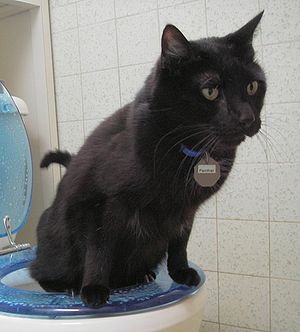Feline constipation may occur because of several reasons, but the most common is generally due to intestinal blockage from hairballs. A cat can groom itself multiple times a day and with each grooming session, it ends up ingesting some its own hair. If the hair ingested is not expelled when it goes to the bathroom, it could end up remaining trapped in the feline’s colon and creating a hairball blockage.
Feline Constipation Symptoms
If a cat is not interested in eating, is not using its litter box as much, or is having pain or difficulty when it does use its litter box, these are signs a feline could be constipated. If a cat cries when attempting to defecate, seems to be straining itself when going to the bathroom, or leaves smaller, dry pieces of fecal matter in the litter box, these are also signs of feline constipation. Litter boxes should be kept clean and free of fecal matter so that the cat will want to use it regularly.
Causes and Home Remedies
While hairballs are usually the main cause of feline constipation, it can also be due to a cat not drinking enough water or having a poor diet without an adequate amount of fiber. If a cat is showing symptoms of constipation, first make sure they have plenty of fresh water to drink so it is able to hydrate itself properly. Next, try adding a tablespoon of one of the following to the cat’s moist food: fish oil, canned pumpkin or petroleum jelly. By ingesting one of these three home remedies, it can help loosen and soften a cat’s stool, allowing it to pass fecal matter more easily and remove the hairball blockage.
To prevent a cat from getting hairballs that may lead to constipation, increase its grooming regimen by brushing it more often to remove loose hairs. This helps keep the cat from ingesting more hair than it should when it grooms itself. Another way to prevent hairballs is to buy specially formulated foods and treats that help reduce hairballs. For a cat with longer hair, keep it well-groomed and consider trimming some of its hair to avoid excessive self-grooming.
